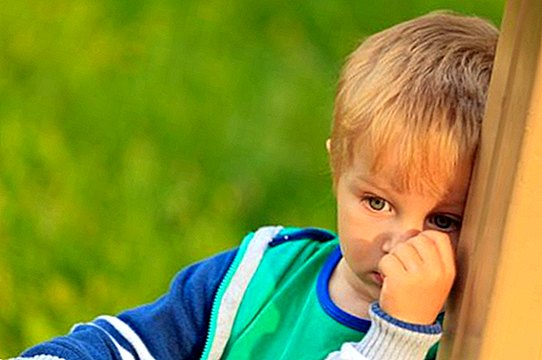5 typical mistakes we make in dealing with timid children

We live in a society that loves the brave and the self-actors. Whether on Youtube or in politics? Extroverted people simply arrive well, they seem to be more successful and easier to survive, while the virtues and talents of the more reserved people tend to be overlooked.
Parents of timid children are often worried about that. Will my child be overbid? Does it have disadvantages because of his temperament later? Is it suffering from his fears?
The author and psychological counselor Doris Schüler has a child herself who was very shy and has managed to overcome his fears. Doris Schüler gives parents tips on how to help and better understand their children in her book, Shaking Up the Shy Children. It also describes some of the typical mistakes we've probably all had in dealing with shy children (or who we experienced as shy children).
Mistake 1: "But you are shy."
You can actually think of it, but adults do it again and again: to imprint the stamp "shy" on the child. Maybe even before a big round of other people. "Most children find it extremely uncomfortable to hear that adults call them shy," says Doris Schüler. This is not helpful, on the contrary: So could shame and feelings of inferiority be triggered? the child retires even more. In the worst case, the child first assumes that shyness is a fixed trait of his and that he will always be shy. Doris Schüler recommends that parents avoid the term altogether and find other words. If other people describe the child as "shy", you can also respond by saying, for example, that it only takes a little time.
Mistake 2: "Now give your aunt's hand!"
A situation that should seem familiar to many parents. Relatives who do not know the child so well invite to a family celebration. At the greeting, the child does not react as the relatives imagine. There is no kiss, it does not shake hands or simply say nothing. To prevent the relatives being taken in, many parents urge their children to behave adequately.
A mistake, according to Doris Schüler. "The child is then in the dilemma of whether it should meet the expectations of parents and family, or whether it may be his own feelings." If it is urged to ignore his own feelings, it may come to the conclusion that his feelings are not right. "With this, the child loses his confidence in one's own feelings and develops a weak sense of self," writes Schüler.
Instead, adults should convey to the child that it can say "no" and stand by their feelings. Can the aunt instead make it clear that the child is going to thaw? if you just do not press it.
Mistake 3: "Go to the other kids and play with me!"
Especially introverted, shy children need more time to get used to new environments and other people. They also prefer to focus on one thing rather than doing a thousand things at the same time. They are more thoughtful and often observe a situation for the first time before they get involved. According to Doris Schüler, it is important for parents to respect these needs and to give the child the feeling that it is alright when they behave that way.
So accept it, if your child prefers to play alone at home, instead of dating. And if you're on a birthday party and your child does not want to play in the romping games, do not press it, just leave it alone. It will join in when it is time.
Mistake 4: "Do you always have to be so loud at home?"
Admittedly, there are more pleasant things than a noisy child in the next room? or even more. But especially with shy children it is important, according to Doris Schüler, that they are allowed to make a noise. Because while they are usually quieter than others outside the house, the shyness often disappears at home. "They often forbid themselves from being offended, for fear that they will be offended." Parents are very supportive of their child when it is noisy, romping, and fooling around at home, "writes Schüler. It is also nice if the parents are really loud together with the child? you can wait until the neighbors are out of the house.
Error 5: "You can not do that yet."
A positive view of the child's abilities is very important, especially with shy children.Instead of mentioning only what the child does not do or does wrong, parents should acknowledge skills and courageous behavior. Do not skimp on praise if your child has managed to make a presentation or buy himself a scoop of ice cream. Strengthens personal responsibility by transferring household tasks to him and, for example, having certain purchases done. It is also helpful to include his opinion in family life, students said. "Participation in decisions strengthens the child's self-confidence." The prerequisite is, of course, that this participation corresponds to the age and not completely overwhelmed.
Book recommendation:

Even more helpful tips and information about the nature of shy children can be found in Doris Schüler's book "Shy Children Strengthen" (Amondis Verlag, 19,95 Euro)










